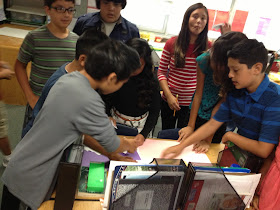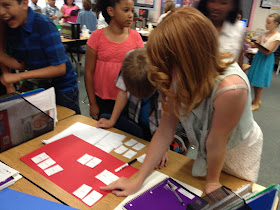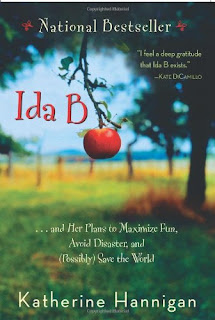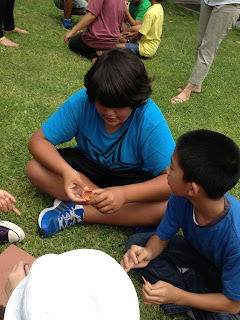Working as a class to find equivalent ratios.
Saturday, August 24, 2013
Cuneiform
Cuneiform is one of the earliest known systems of writing, distinguished by its "wedge-shaped" marks on clay tablets, made my means of a blunt reed for a stylus. 6th graders made their own cuneiform during their Mesopotamia unit!
Literature Circles
Our class has started their literature circle groups! In literature circles, small groups of students gather together to discuss a piece of literature in depth. The discussion is guided by students' response to what they have read. Literature circles provide a way for students to engage in critical thinking and reflection as they read, discuss, and respond to books. Collaboration is at the heart of this approach. Students reshape and add onto their understanding as they construct meaning with other readers. Finally, literature circles guide students to deeper understanding of what they read through structured discussion and extended written and artistic response.
Here are the books being read:
Here are students in their first meeting:
Ruby Holler
Following Fake Man
The Westing Game
Crispin
Al Capone Does My Shirts
Ida B.
Wednesday, August 21, 2013
6th Grade Mesopotamia
In social studies 6th graders or learning about Ancient Mesopotamia.
Kayla and Summer giving a PowerPoint presentation on Mesopotamia.
Here is a look into the foldable they are making. They will contain a map, the geography, agriculture, writing, social pyramid, religion, Hammurabi, art and architecture, and the achievements.
5th Grade Totem Poles
Totem poles are carved by Native Americans of the Northwest Coast. These people did not have a written language, so totem poles were a way of recording their legends. They were also used to honor important people.
Connor decided to make his totem pole using Legos.
Emma deciding what symbol to make next.
Sofia and Gina showing off their totem poles!
James painting his symbol
Michaela decided to make her totem pole out of wood!
Malia is sketching her next symbol.
Sophia and her glitzy glamorous totem pole.
Dylan is waiting for his wings to dry.


Thursday, August 15, 2013
Wonder
As our classroom read-aloud we are reading Wonder by R.J. Palacio.
The publisher's description:
"August (Auggie) Pullman was born with a facial deformity that prevented him from going to a mainstream school—until now. He's about to start 5th grade at Beecher Prep, and if you've ever been the new kid then you know how hard that can be. The thing is Auggie's just an ordinary kid, with an extraordinary face. But can he convince his new classmates that he's just like them, despite appearances?"


The publisher's description:
"August (Auggie) Pullman was born with a facial deformity that prevented him from going to a mainstream school—until now. He's about to start 5th grade at Beecher Prep, and if you've ever been the new kid then you know how hard that can be. The thing is Auggie's just an ordinary kid, with an extraordinary face. But can he convince his new classmates that he's just like them, despite appearances?"
Students practiced the illustrator literature circle job. We never see what August looks like, but Palacio gives us many detailed descriptions of what his face looks like. Our class had to listen to the descriptions and draw what they thought August looked like.


Conceptual Math Group Work
5th Graders have been working with place value. They have been coming up with multiple models/strategies to express their work, looking for patterns, and using mathematical explanations to tell how and why their answer is correct.


6th Graders have been working with ratios: using multiple models to express ratios, looking for the constant, and finding the value.

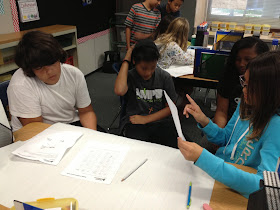




6th Graders have been working with ratios: using multiple models to express ratios, looking for the constant, and finding the value.






